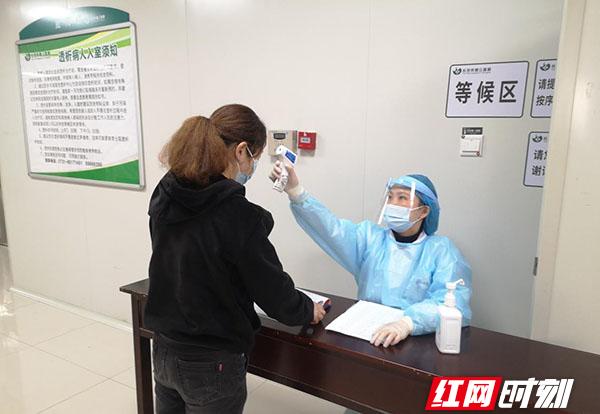Red Network Moment News April 7 (Correspondent Tang Xuan) Recently, Mr. Hu, a uremia patient, was relieved to receive hemodialysis for up to 4 hours in the single room observation room of the special fever clinic of changsha third hospital. However, just 3 days ago, Mr. Hu and his family were still anxious about hemodialysis.
Originally, due to the spread of the epidemic in many places, the community where Mr. Hu lived was divided into a closed area. Seeing that it is about to be the time of the next hemodialysis, the epidemic prevention and control measures of "staying at home" have overwhelmed Mr. Hu's family.
At 8:00 p.m. on March 31, Mr. Hu developed symptoms of heart failure such as shortness of breath, sweating, and mental trance, and after coordination between the community and the medical department of Changsha Third Hospital, Mr. Hu was urgently sent to the single room observation room of the hospital's special fever clinic by 120.
After admission, Mr. Hu had up to 800 micromoles/L of blood creatinine, combined with metabolic acidosis, and was in urgent need of hemodialysis treatment.
Considering the requirements of epidemic prevention and control, Xiang Hui, deputy director of the Department of Nephrology and Internal Medicine, who was on duty that night, helped Mr. Hu pay fees, take medicines, deliver medicines, and settle patients before and after.
Ma Fang, a nurse at the Nephrology Internal Medicine Blood Purification Center, received an emergency dispatch call and rushed to the hospital, nervously carrying out the preparation work before hemodialysis: checking the doctor's instructions, installing the pipeline, pre-rushing to the machine, puncturing and leading the blood, accompanied by the rotation of the machine, after 30 minutes, the blood after dialysis was sent back to the body, and Mr. Hu's condition gradually stabilized.
Mr. Hu's family, who successfully completed hemodialysis, could not stop thanking him.
Uremia patients like Mr. Hu are a special group that needs hemodialysis treatment 2-3 times a week to maintain life due to impaired kidney function. Even in the context of epidemic prevention and control, hemodialysis cannot be suspended or postponed.
How to ensure that the hemodialysis treatment of such patients is not affected, the medical staff of the Blood Purification Center of the Department of Nephrology and Internal Medicine of the Third Hospital of Changsha City have made many efforts.

In order to strengthen the management of patients and minimize the risk of hospital sense, the department implements the responsibility partition management method, that is, the responsible nurses sort out the situation of the patients they manage, carry out epidemiological investigations, and confirm the status of their health codes and itinerary codes to deal with special situations in advance.
Medical staff also through the WeChat group, to patients and their families during the epidemic protection knowledge guidance, immediate answer questions and answer questions; for patients who do not regularly undergo hemodialysis, medical staff will also contact in a timely manner to implement the specific situation of patients and ensure the safety of each patient.
From 7:30 a.m. to 11 p.m., the blood purification center's 30 dialysis machines were "fully powered" to complete hemodialysis treatment for all patients.
In order to ensure the medical needs of special groups during the epidemic prevention and control period, realize the diversion of hospitals and reduce the risk of hospital feelings, the Third Hospital of Changsha City has formulated a special plan, set up a separate treatment and hospitalization area, and opened a special green channel to ensure that patients receive timely treatment; at the same time, the hospital has specially arranged a number of experienced medical staff to be in the clinical frontline, meticulous treatment, and ensure the treatment effect of patients. In the past week, the hospital has received and treated 52 patients with various acute and critical diseases, and carried out hemodialysis treatment for 11 uremia patients.